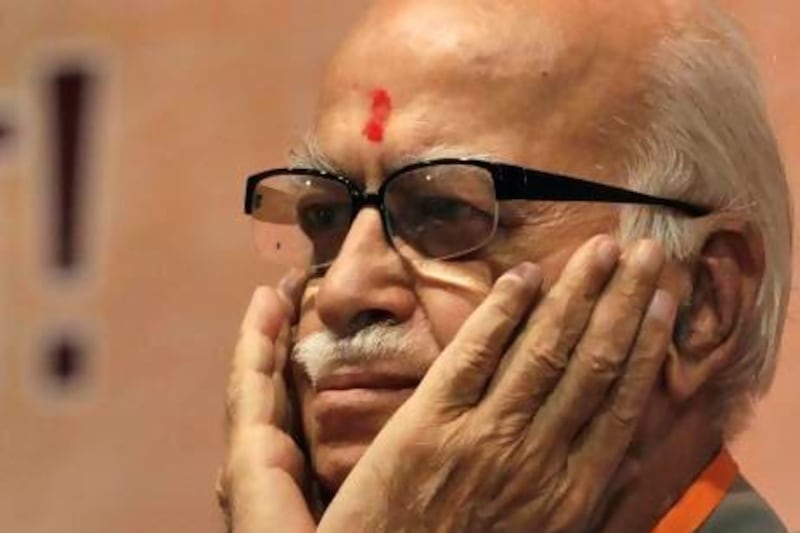NEW DELHI // BJP veteran LK Advani resigned from three of his party posts yesterday in an angry response to the appointment of Narendra Modi as the head of its campaign committee.
Mr Advani's resignation coupled with the stormy process by which the decision was made has exposed divisions within the Bharatiya Janata Party which threaten to fragment its opposition alliance ahead of next year's elections.
In a letter to the BJP president Rajnath Singh, Mr Advani, 85, said he disagreed with the party's direction.
"Most leaders of ours are now concerned just with their personal agendas," he said.
His resignation letter has been seen as a swipe at Mr Modi, who has emerged as an alternative power within the BJP, and who is the front-runner to become the party's prime ministerial candidate in the 2014 elections.
The appointment of Mr Modi, chief minister of the state of Gujarat for over a decade, was announced on Sunday afternoon in Goa, during a conclave of the BJP, the country's main opposition party. Mr Advani, citing ill health, stayed away from the conclave.
Mr Singh said on Twitter that he had not accepted the resignation of Mr Advani, who was the BJP's prime ministerial candidate during its unsuccessful campaign in the 2009 general election .
Several senior BJP leaders visited Mr Advani's residence yesterday to persuade him to change his decision.
Within hours of Mr Advani's resignation, one of the BJP's key allies, the Janata Dal (United), hinted that it would reconsider its decision to stay in the National Democratic Alliance, which the BJP heads.
Mr Advani's decision, said Nitish Kumar, one of the Janata Dal (United)'s leaders and the chief minister of Bihar, was "an unfortunate development that may have its bearing on the BJP's relationship with its allies."
The Congress party, which heads the current coalition that governs India, was quick to criticise the BJP.
"It's clear now that personal ambitions are dominating the functioning of the BJP," said Rita Bahuguna Joshi, a Congress spokeswoman.
Mr Advani has not given up his membership of the BJP itself. He has been a member of the party ever since its formation in 1980.
But the BJP now approaches elections in a state of flux.
Primary among the BJP's challenges is the still-unanswered question of whom it will project to be its candidate for prime minister.
Mr Modi's latest elevation as campaign committee leader, although significant, is by no means an anointment as candidate. In the past two general elections, in 2004 and 2009, the BJP's campaign committee was headed by men who were not the party's first choice for prime minister.
The dynamics of coalition politics demand that the BJP come up with a candidate agreeable to the other, smaller parties in the National Democratic Alliance.
But Mr Modi is not a natural consensus candidate. He has been dogged by the anti-Muslim riots that happened under his watch in 2002, and by his reputation as an authoritarian leader.
His supporters, however, call him an inspirational, energetic leader who has transformed Gujarat, creating a positive economic climate in the state. He also appeals strongly to the Hindu right, which forms a significant chunk of the BJP's voter base.
"A lot of hoopla has been created around every little thing Modi has done, to make it look like a great achievement," said Anil Bairwal, the national convener of the non-profit Association for Democratic Reforms. "But Modi is a polarising figure."
Even within the BJP, Mr Modi is elicits contrasting reactions.
A leader of the BJP's youth wing, who asked not to be quoted by name, told The National that while Mr Modi was adored by the party's rank and file, he inspired deep divisions among its upper echelons.
The BJP member said a number of senior party leaders were unhappy with Mr Modi's authoritarianism and wanted to keep him out of the innermost circles of power, including Mr Advani, Arun Jaitley and Yashwant Sinha.
During the BJP's campaigning in the Gujarat state elections late last year, he said: "Modi and Advani would often be in the same room, to eat lunch or to eat dinner, say. But they would sit on different tables at far ends of the room."
"As far as I could see, throughout the campaign, they didn't say a single word to each other."
Such clashes of personality and internal strife are diverting the BJP from thinking about serious strategies to challenge the government, some party leaders have said.
"Politics must be based on issues, not on personalities," Yashwant Sinha, a BJP leader and a former Indian finance minister, told reporters on Sunday, "especially today when we have so many issues to raise against the government of the day."
In his acceptance speech on Sunday, Mr Modi too did not lay out any policy prescriptions. He only promised that he would "leave no stone unturned for a Congress-free India".
ssubramanian@thenational.ae





